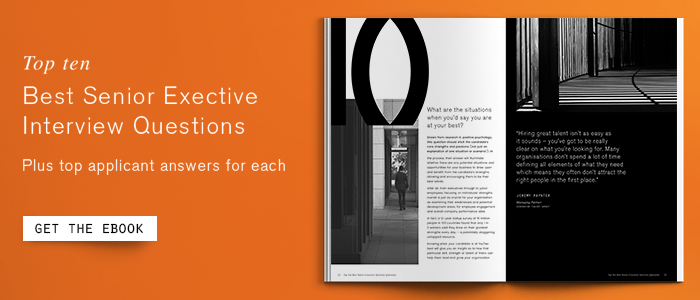25th November 2016
What To Look For In A Resume When Hiring Future Leaders
I was in a conversation with an HR leader recently, who mentioned that they, and their recruiting team, are constantly bombarded with poorly written resumes making the identification of potential a tedious process. We were discussing the challenges for recruiting future leaders and they were keen to know how long I usually spent reviewing a resume before deciding to take the candidate further.
My response?
It usually takes about 90 seconds to scan a resume and decide if the candidate should be interviewed — but I don’t necessarily focus on the formatting or layout.
My approach involves scanning every resume for inherent markers of executive potential that could be identified on even the most poorly formatted CVs. While technology has gradually improved the way we recruit, managers still find themselves having limited limited to scan candidate CVs so how we spend this time is extremely crucial.
These key markers for leadership potential are a rule of thumb — each on their own is only a generalisation, and they aren’t the be all and end all of assessment. Consider them as smoke signals. If you see three, four or five, you can’t help but think that where there is smoke there must be fire.
The markers of a future leader
Below are the nine markers or signals you should look out for when finding future executive talent. Consider this our trusted guide in helping you shortlist candidates for an interview.
1. At least 2 promotions within 2 ‘highly-regarded’ organisations
People typically get promoted because they demonstrate more performance, drive and/or judgment than their peers. ‘Blue chip’ or ‘academy’ companies tend have good systems for identifying developing, and managing talent. And good companies don’t tend to promote under performers. It’s one thing to get promoted within one academy company, it’s a really good sign when it happens in two of them.
2. A Master’s degree
Post graduate study suggests the individual is willing to invest the time, effort and expense in themselves to get ahead. This is a good marker of ambition and is particularly important for those pursuing ‘expert or specialist’ type roles.
3. Cross functional experience
There aren’t many people in the C-Suite who haven’t spent some time outside of their ‘home function’. Being able to handle a cross functional move is a signal that the individual has transition skill, perspective, and the ability to learn & succeed in new situations.
4. Field and corporate office experience
People who’ve spent their whole lives in a ‘corporate office’ may lack the customer or operational perspective to get to the top. Likewise, people who’ve only been in divisional or regional roles may lack the organisational or political savvy and that particular ability to influence without authority necessary to get things done. Seeing both in a resume is a great sign for a candidate.
5. People management roles
There’s an old saying, “if you can’t manage people you can’t manage”. There are very few jobs at the top that don’t involve managing large groups of people, so having experience in larger managerial roles is non-negotiable.
6. Executive education at a leading University
Look out for candidates who’ve completed higher education courses at the executive level at renowned institutions such as Harvard, Stanford, INSEAD or Wharton. While what the individuals learn at these type of programs is important, the reality is, these programs are expensive and organisations generally only invest in their best talent so it’s further validation of a worthy candidate.
7. International experience
A candidate with international experience typically suggests a broader perspective and is more open to diversity, and capable of dealing with transition & ambiguity, resilience.
8. Second language
Look out for candidates who list fluency in a second language. Having a second language could be an indicator the individual possesses a higher degree of cross cultural acumen than their peers.
9. Evidence of some career risk
Probably a harder marker to spot but when someone has willingly taken personal risk in career decisions or made significant personal investment e.g. starting their own business or making an industry change — it could be a sign of a true self development orientation.
As mentioned before, these markers aren’t the be all and end all. This being said, they are important indicators and if you find a CV which satisfies at least four of these markers, it’s time to arrange an interview with the candidate. A one-to-one chat gives you further opportunity to explore the candidate’s accomplishment in these areas and really get a real handle on the adversity, diversity, variety and intensity of experience they have developed.
Putting leadership experience examples to the test
Pick a company you admire and go to their website to see who’s on their Executive Team (or look them up on LinkedIn). Regardless of the industry or company size, you’ll probably find that the most senior executives of the most successful companies possess a number of these leadership markers in their bios.
Knowing what to look for in a CV can help you overcome some talent search challenges. But it doesn’t end there. To identify a future leader, you need a robust interview approach – as this can give you a full picture of a candidate’s skill set and personality.
We’ve put together our Top 10 Senior Executive Questions to help you ask questions that dig beneath the surface and provide clear leadership insights. Click the image below to get your free copy.
Categories: Acquiring Talent




